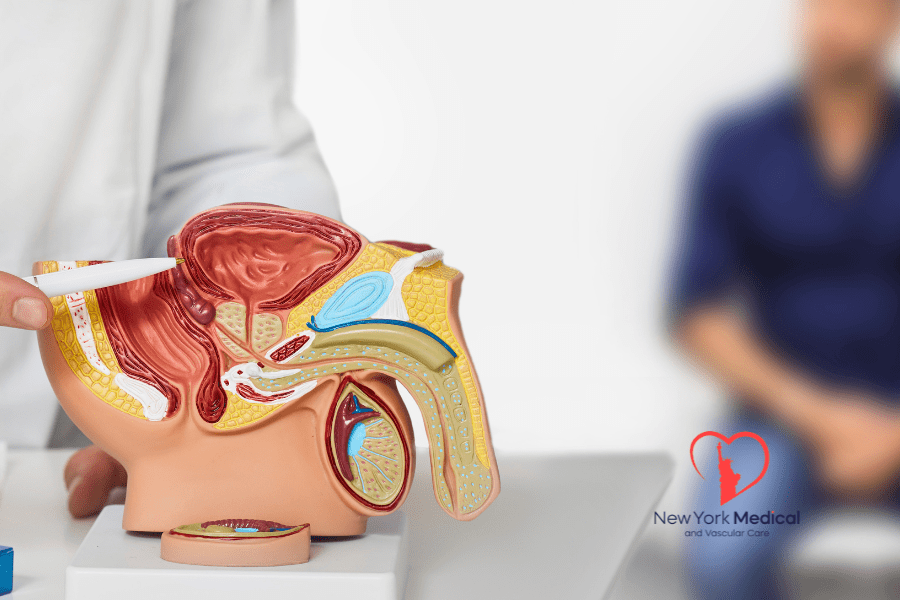Prostate cancer is one of the most common cancers among men, particularly those over the age of 50. Early detection is key to successful treatment, making it essential for men to understand the symptoms, risk factors, and prevention strategies. At New York Medical and Vascular Care (NYMVCare), we are dedicated to raising awareness about prostate cancer and providing comprehensive care for those affected. Here’s everything you need to know about prostate cancer, its prevention, and treatment options.
What is Prostate Cancer?
Prostate cancer develops in the prostate gland, a small walnut-shaped gland that produces seminal fluid. While some prostate cancers grow slowly and may not cause significant harm, others can be aggressive and spread quickly.
- Localized Prostate Cancer: Cancer confined to the prostate gland.
- Advanced Prostate Cancer: Cancer that has spread beyond the prostate to other parts of the body, such as the bones or lymph nodes.
Symptoms of Prostate Cancer
Prostate cancer often develops without noticeable symptoms in its early stages, which is why regular screening is crucial. As the disease progresses, symptoms may include:
- Difficulty urinating or a weak urine stream.
- Frequent urination, especially at night.
- Blood in the urine or semen.
- Pain or discomfort in the pelvic area.
- Erectile dysfunction.
- Bone pain (in cases of advanced cancer).
If you experience any of these symptoms, consult a healthcare provider promptly for evaluation.
Risk Factors for Prostate Cancer
Certain factors can increase a man’s risk of developing prostate cancer, including:
- Age: Risk increases significantly after age 50.
- Family History: Having a father, brother, or close relative with prostate cancer raises the risk.
- Race: African American men are at higher risk and often have more aggressive forms of prostate cancer.
- Diet and Lifestyle: High-fat diets and obesity have been linked to an increased risk.
Prevention of Prostate Cancer
While there is no guaranteed way to prevent prostate cancer, adopting a healthy lifestyle can help reduce risk:
- Eat a Balanced Diet: Focus on fruits, vegetables, whole grains, and lean proteins. Limit consumption of red meat and high-fat foods.
- Exercise Regularly: Staying active helps maintain a healthy weight and reduces the risk of cancer.
- Avoid Smoking: Smoking is associated with more aggressive prostate cancer.
- Get Regular Screenings: Prostate-specific antigen (PSA) blood tests and digital rectal exams (DRE) can help detect prostate cancer early when it is most treatable.
- Consider Medication: In some cases, medications like 5-alpha reductase inhibitors may be prescribed to lower the risk of developing prostate cancer.
Diagnosis of Prostate Cancer
Prostate cancer is typically diagnosed through:
- Prostate-Specific Antigen (PSA) Test: Measures the level of PSA in the blood. Elevated levels may indicate prostate cancer or other conditions.
- Digital Rectal Exam (DRE): A physical exam to check for abnormalities in the prostate.
- Biopsy: If tests suggest cancer, a biopsy may be performed to confirm the diagnosis.
- Imaging Tests: MRI, CT scans, or bone scans may be used to determine the extent of cancer.
Treatment Options for Prostate Cancer
Treatment depends on the stage and aggressiveness of the cancer, as well as the patient’s overall health. Common treatment options include:
Active Surveillance:
- For low-risk cancers that grow slowly, doctors may monitor the cancer closely without immediate treatment.
Surgery:
- Radical Prostatectomy: The removal of the prostate gland is often recommended for localized cancer.
Radiation Therapy:
- External beam radiation or brachytherapy (internal radiation) may be used to destroy cancer cells.
Hormone Therapy:
- Used to reduce testosterone levels, which can fuel the growth of prostate cancer.
Chemotherapy:
- Used for advanced prostate cancer that does not respond to hormone therapy.
Immunotherapy:
- Stimulates the immune system to attack cancer cells, often used in advanced or recurrent cases.
Targeted Therapy:
- Focuses on specific genetic mutations in cancer cells, offering a personalized approach to treatment.
When to See a Doctor
Men should consider regular screenings for prostate cancer starting at age 50, or earlier if they have risk factors such as family history or are African American. If you experience symptoms such as difficulty urinating or pelvic pain, consult a healthcare provider immediately.
Conclusion
Prostate cancer is a serious condition, but early detection and timely treatment can lead to successful outcomes. By staying informed, adopting healthy habits, and scheduling regular screenings, you can take control of your prostate health. If you have concerns about prostate cancer or would like to schedule a screening, contact NYMVCare today for expert care.
Written by DapraLab


